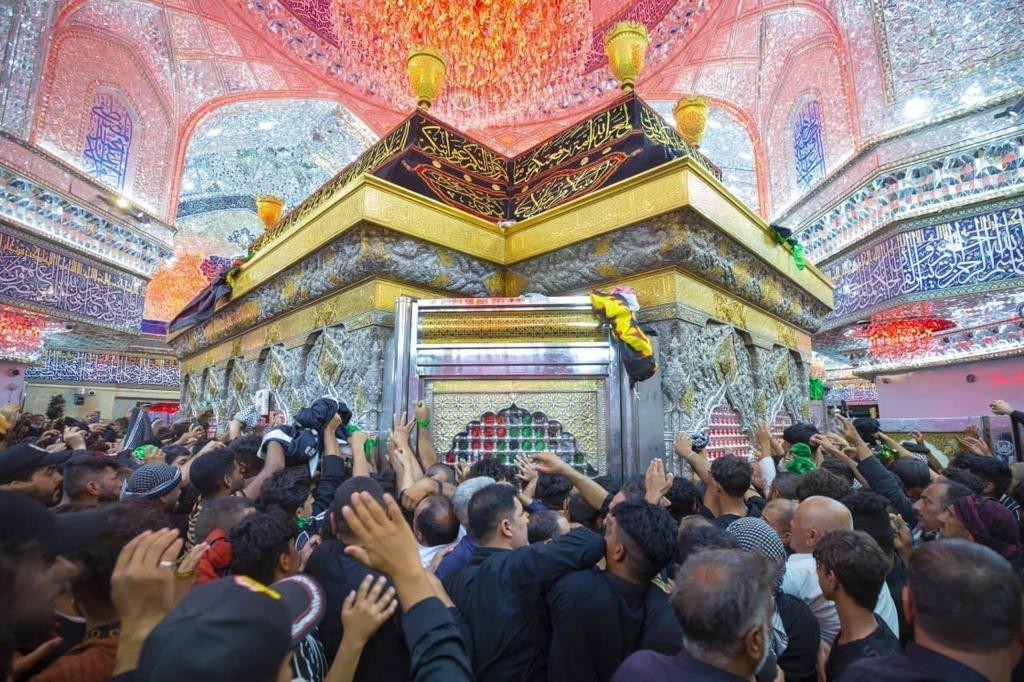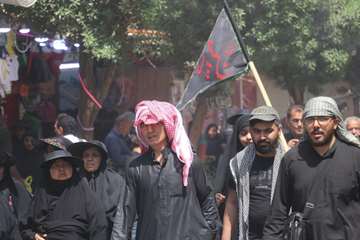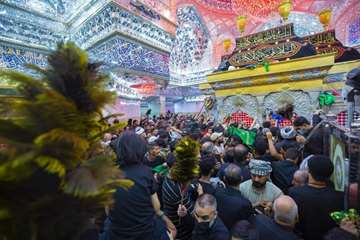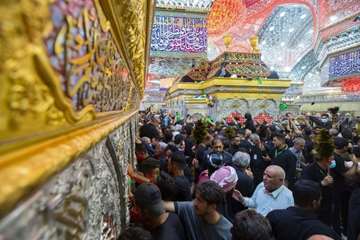Arbaeen; A Pilgrimage of Peace and Tolerance
For many non-Muslims who visit Karbala, Imam Husain ibn Ali (AS) is not a figure who is exclusive to one particular religious sect but rather an inspiring symbol for humanity as a whole.

The annual pilgrimage of Arbaeen is one of the most significant events in the Shiite religious calendar when millions of Shiites from Iraq and around the world come together to travel on foot to the holy city of Karbala. Arbaeen moves not only Shiites but also members of Iraq’s other religious communities to action, such as Samir Mate, a 34-year-old Christian resident of Babylon (Babil) Governorate who says:
“Every year I take part in the Arbaeen procession along with my Muslim brothers, offering them help and the services they need. I also prepare food and distribute it in the name of Imam Al-Husain, and after the end of the observances (of the Arbaeen rituals), I offer to take the pilgrims home for free.”
The holy tradition of Arbaeen (“The 40th”) emerged in Year 61 in the Hijri calendar (680 CE), 40 days after the martyrdom of Imam Husain ibn Ali (AS), a grandson of Prophet Muhammad (PBUH). The Imam and his supporters were slain in a battle in modern-day Karbala against the forces sent by the Damascus-based Yazid ibn Mu’awiya. The massacre of Imam Husain and his heavily outnumbered followers took place on the 10th day of the Islamic lunar month of Muharram, which is why the occasion is referred to as Ashura (meaning “The 10th”).
Imam Husain entrusted his message of tolerance and acceptance of others to the mothers, wives, and daughters of his slain companions. Captured by the army of the caliph, these women were forced to walk to Damascus in their grief. Yet they survived to spread the news of the Battle of Karbala and the divine message of the prophet’s grandson.
In remembrance of Imam Husain and the suffering of his women supporters, Shiite Muslims walk long distances on foot to Karbala to pay their respects to the Imam’s Shrine and that of his brother and companion, Hazrat Abolfazl al-Abbas, to mark the anniversary of the fortieth day after their killing.
For many non-Muslims who visit Karbala, Imam Husain ibn Ali (AS) is not a figure who is exclusive to one particular religious sect but rather an inspiring symbol for humanity as a whole. Mate says he enjoys the reactions of the pilgrims when they learn that he is Christian and offer him their thanks and respect. To reiterate, he is one of many non-Shiites who take part in the Arbaeen processions and offer help and services to visitors.
Semi-official figures estimate that more than 15 million people participate annually in the Arbaeen walk, including visitors from many foreign countries arriving by car or through Najaf, Baghdad, and even Basra International Airports.
Every year lovers of freedom travel long distances, each according to his own way of understanding Imam Husain’s cause. These crowds gather under the banner of the freedom that Imam Husain invoked in his call to ‘be free in your world’ which was addressed to all human beings and is a message of love, sincerity, and valor”, says Ali Abdul Jalil Shaabeth who is a research scholar.
According to Shaabeth, this approach reminds us of our humanitarian responsibilities and how we must translate these duties into action through our behavior, our shared humanity, and our adherence to the principles of Husain ibn Ali’s revolution in Karbala.
Hazem Eden Oğlu, an Iraqi Turkmen living in Babylon Governorate, participates annually in the Arbaeen observances, providing food, drink, and lodging to pilgrims from around the world. Eden Oğlu is a member of the Turkmen Front, which opens its doors every year on 60th Street; the main road for visitors traveling to Karbala. He says what makes Karbala and Arbaeen walk special to him is the constant contact he has with the members and elders of other religious groups. Karbala, for him, is a city that welcomes visitors with open arms, helping them feel at home. This, of course, includes the millions of visitors who arrive during Arbaeen.
The annual pilgrimage and the warm welcome of Karbala’s residents have played a pivotal role in bridging divides and fostering connections between different communities. Local residents regularly open their homes to visitors from other cities and keep in touch with their guests long after the event, often visiting them in their home cities. These bonds promote the strong foundations of Iraqi society and the peaceful co-existence of its diverse religious communities.
“It gives us hope and pleasure. It is a clear indication of the depth of fraternal kinship among the people and the cohesion of communities based on respect and human nobility that people have always shown each other”, says Shiite cleric Sheikh Khodr Al-Hilli.
Quoting the Holy Qur’an: “And hold firmly to the rope of Allah all together and do not become divided [3:103]”, Sheikh Hilli said that Allah Almighty has instructed us on the need to preserve unity and not to be divided. “Allah has also asked us to stick to human morals, cooperation, love, communication, and hard work in order to maintain the social fabric and stay together in unity. Imam Ali bin Abi Talib (the father of Imam Husain) said, ‘People are of two types, they are either your brothers in faith or your equals in humanity’.”
Mahmoud Hassan Abbas, a 27-year-old member of Iraq’s Shabak ethnic and linguistic minority who lives in Mosul, participates annually in a group called ‘Activists for the Love of Husain, which brings together young people from many different religious groups and from all over Iraq in support of the annual pilgrimage to Karbala. Christians, Mandaeans, Sunni Muslims as well as Kurds, Turkmen, Shabaks, Syrians, Chaldeans, and Kakais all take part in the campaign which coordinates its activities with the administrative and security authorities in Karbala Governorate.
“We participate as civilian activists motivated by humanitarian motives and religious responsibilities in accordance with the teachings of the higher religious authorities,” Abbas said, adding that the campaign is entirely independent and not affiliated with any political figure or party.
“We offer our services to ensure the success of the Arbaeen pilgrimage welcoming both male and female visitors in a fraternal spirit since we believe in the cause of Imam Husain (AS).”
Togetherness and cooperation of communities is very much in evidence on the roads leading to Karbala during Arbaeen. Witnessing millions of people, regardless of their religious or national background, participating in and contributing to the security and the success of the observances, Arbaeen offers an ideal image of coexistence and the language of brotherhood and human fraternity.





Write your comment.